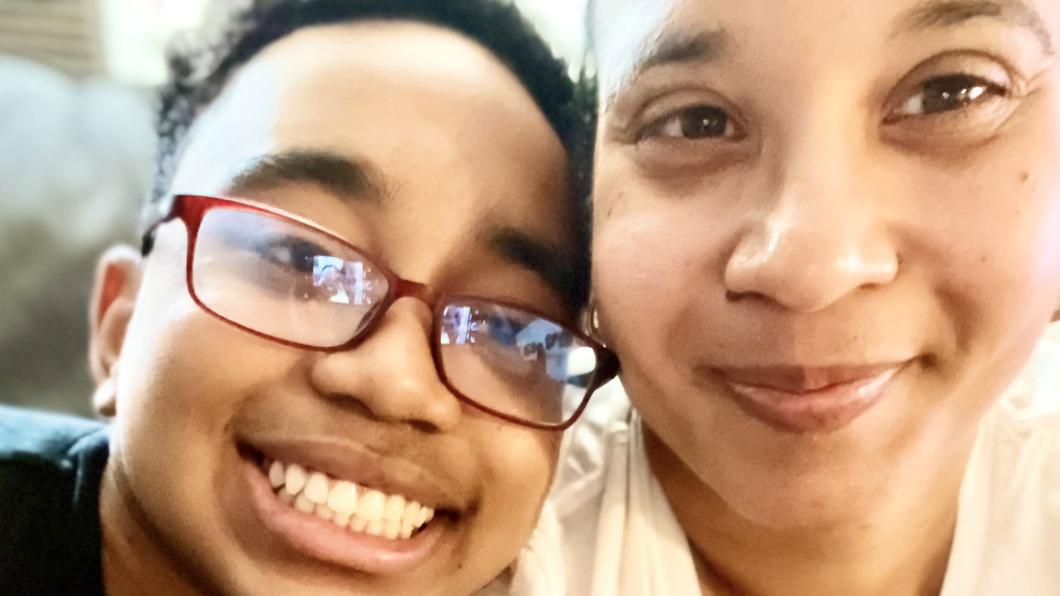
Acceptance helped Alifa 'wake up to my child as he is right now'
Alifa Khan (right) and son Junayd
By Louise Kinross
Alifa Khan talks about how she parented before and after she learned about acceptance and commitment therapy (ACT). Her son Junayd, 15, has autism.
Before, "I would ruminate a lot on trying to come up with the perfect solution," she says. "It was an endless pursuit of wanting things to be different, not knowing how to make them different, and feeling it was my responsibility, like the responsibility of doing applied behaviour analysis (ABA) therapy. Early on I thought ABA could help fix my child. ACT gave me the acceptance of knowing there's no magical 'let me think it better, let me will it better, let me beat myself up for it not being better.'"
After training to co-lead ACT workshops for parents at Holland Bloorview, Alifa was able to "wake up to my child as he is right now," to let go of cultural expectations of who he should be, and to develop greater compassion for herself and others.
ACT can be helpful for parents of children with disabilities because "it accepts pain as part of the human experience," says Robin Hermolin, one of the clinicians who co-leads the six two-hour sessions with Alifa for caregivers of Holland Bloorview clients. "ACT doesn't try to change or replace painful thoughts, feelings, memories or fears for the future. We know that when we fight against or push away those thoughts and emotions, it actually intensifies them. In ACT we learn to notice those thoughts and feelings and engage with tools to manage them. When we give up that struggle, we can free up energy to put towards the things that matter most to us. A big part of ACT is focusing on what we value, and how to move towards living a life in line with our values."
Goals are to "allow parents who give so much as caregivers to focus on themselves, and to increase their psychological flexibility," Robin says. That includes learning tools to accept and unhook from painful thoughts. For example, an exercise called leaves on a stream is a guided meditation that invites participants to look at "thoughts and feelings as they come up without judgement, simply noticing them as leaves on a stream," Robin says. "Instead of following or chasing or getting attached to these thoughts, we notice that they might get stuck and lodged on a rock, but eventually they float on by. Thoughts come and go. It's natural for these thoughts to show up, and when we can notice them without struggling with them, it can be quite freeing."
Having a child with a disability can shake up a person's ideas about what's important in life. Yet "often parents don't have a lot of space to think about that," Robin says. "We do exercises to help identify what matters most to them." Parents choose key personal values and determine what actions will bring them closer to their values.
Alifa notes that she grew up with cultural ideas about how "children should listen, behave, and speak when they're spoken to. There were also [academic] expectations about what career a child had to pursue. I used to feel pressure or blame or shame toward myself around the fact that my son wasn't doing well at school, or couldn't do these things that I had somehow aspired for him." ACT helped her "change the narrative," she says. "When I sat down and thought about it, I want him to be happy, to feel connected and supported and be part of a community, and to be kind. It shook me to my core to reconsider what's most important."
As a family leader at Holland Bloorview, Alifa wanted to co-lead our ACT series for caregivers because "there's something sacred about it. Despite what type of disability a parent's child may have, there's an invisible thread that allows each person to feel seen and heard, and to be able to come in fully as themselves. They're accepted. They get it."
Robin says having Alifa co-deliver the workshops "is at the heart of their success. We've heard from participants that Alifa's firsthand experience creates trust and comfort. Parents feel more represented and supported and understood. Alifa adds so much value and authenticity to the group."
Holland Bloorview has offered this ACT series twice. The next session begins on October 17, and will be facilitated by Robin, Alifa and Shawna Perkins. Registration is open until Oct. 10. Please e-mail ACT@hollandbloorview.ca to register. The virtual program is part of a research study at CAMH that is following six sites across Canada.
The Happiness Trap: How to Stop Struggling and Start Living provides a great overview of ACT. BLOOM did this 2017 piece about a study that found mothers of children with autism reported significant drops in depression and stress and improvements in physical health after participating in ACT. Like this story? Sign up for our monthly BLOOM e-letter. You'll get family stories and expert advice on raising children with disabilities; interviews with activists, clinicians and researchers; and disability news.